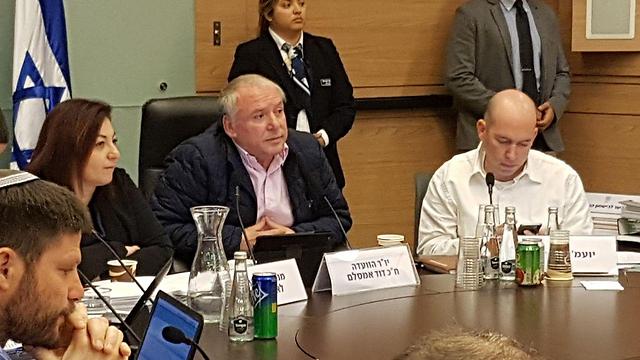
Kulanu, Bayit Yehudi voice reservations over recommendation bill
Rushed legislative process and claims the bill is tailor-made for PM Netanyahu lead coalition partners to ask to have bill go into effect in three months to ensure it does not apply to the investigations against Netanyahu; Minister Elkin proposes to postpone vote by a week.
Members from the two coalition partners raised qualms about the fact the bill appears to be tailor-made to help Prime Minister Benjamin Netanyahu, who is being investigated by police for corruption.
The lawmakers from the two parties also expressed unease over the fact the legislation was being rushed through the Knesset, to the point ministers and MKs who are currently abroad on work trips were asked to return to Israel by Monday so they could attend the vote on the bill's second and third readings.
Justice Minister Ayelet Shaked, Regional Cooperation Minister Tzachi Hanegbi, Knesset House Committee chairman MK Yoav Kisch and MK Amir Ohana are all currently abroad.
Coalition heads initially considered postponing the vote, but eventually decided to hold it on Monday regardless, requiring some of the lawmakers to arrive at the Knesset straight from the airport.
Nevertheless, during a Likud ministers meeting on Sunday, Minister Ze'ev Elkin proposed to postpone the vote in a week.
MK Merav Ben-Ari (Kulanu) submitted reservations to the bill during a meeting of the Knesset's Internal Affairs Committee on Sunday, conditioning her support to the legislation in it going into effect 90 days after its approval—rather than two weeks—to ensure it does not apply to the investigations against Prime Minister Netanyahu.
"It's time to deal with the bill's implementation to avoid even the appearance of a 'personal law,'" she wrote on Twitter.
Her fellow Kulanu party member Rachel Azaria has already announced she would vote against the legislation, after criticizing it extensively.
Likud MK Oren Hazan, meanwhile, said while he thought the bill was good, "in its current timing, it is causing damage to the prime minister and the Likud party."
Bayit Yehudi Knesset faction leader MK Mualem-Rafaeli was of the same mind as Hazan, saying her party "has a problem with the bill in the current timing. We hear and see public murmurings. In its essence, this is a good bill, but we wouldn't have proposed such a bill ourselves."
Justice Minister Ayelet Shaked, also of Bayit Yehudi, said at the Saban Forum in Washington that while she too thought the bill had merit, "The people did not elect a right-wing government to pass the recommendations bill."
Bayit Yehudi leadership has been debating whether to allow party members the freedom to vote on the bill as they see fit, after it was already given to members of the Kulanu party.
Meanwhile, opposition members were also fighting the legislation at the committee, submitting hundreds of reservations as part of a filibuster. Yesh Atid submitted over 500 reservations, Zionist Union submitted some 200, while Meretz submitted some 100 additional reservations.
MK Mickey Levy (Yesh Atid) argued the legislation was "meant for silencing." He later read out his reservations to the tune of the song "Jerusalem of Gold," prompting committee chairman David Amsalem (Likud) to rebuke him, saying "Don't be a clown, stop making mockery of the Knesset." Other MKs responded to Amsalem, saying "You're making a mockery."
Fellow Yesh Atid MK Yael German said "the reservations are based on the fact the law will change all the time. But the cat's out of the bag, when the cases in questions are the ones accompanied by an attorney, it's clear who the bill is for."
Amsalem, one of the promoters of the bill, responded that "This isn't true, but keep on lying. Your words are inaccurate."
Objections to the bill also came from Netanyahu's own party. During an interview on Meet the Press on Saturday, Likud MK Benny Begin, who was ousted from the Internal Affairs Committee due to his objection to the bill, dubbed the move as "the use of the ruling party to aid the one at its head."
The recommendations bill, which is also opposed by Attorney General Avichai Mandelblit, would prevent the police from offering its opinion in instances when the investigation includes an attorney, with the official reason being that they would be the best authority to decide the case's chance of winning an indictment. The bill also states that if a leak in such a case occurs, the leaker would face a year in prison.
The newer version of the bill states that even when an attorney is already on the case, the attorney general could nevertheless requests that the police issue its recommendations.
The police could also offer recommendations in any instance where it is decided to close the case.
After being approved by the Internal Affairs Committee, the recommendations bill was brought to a vote in the Knesset and passed its first reading with 46 votes in favor and 37 against. It has now returned to the committee for discussions ahead of the second and third reading votes.
Zionist Union MK Yoel Hasson told Ynet on Sunday the recommendation bill "has rocked all systems, caused the loss of the checks and balances. This corrupt bill caused on the one hand to reckless behavior by the Knesset, the coalition, the prime minister's people, and on the other hand led to an extreme reaction from law enforcement officials."
Tens of thousands of people protested in Tel Aviv against the legislation and government corruption on Saturday night. There were also protests held in Haifa, Jerusalem, Rosh Pina and other cities.
Yishai Porat contributed to this report.












